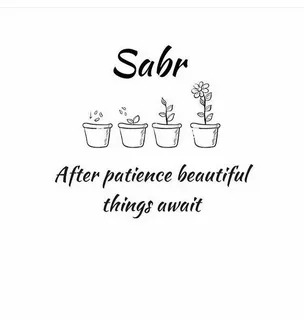In a world marked by constant challenges and uncertainties, finding solace and strength in one’s faith becomes essential. Patience, or ‘Sabr’ in Arabic, is a virtue highly revered in Islam. It is the ability to endure hardships and tribulations with unwavering faith and steadfastness. In this article on Arabian Tongue website, we will delve into the profound wisdom of Islamic Quotes About Patience In English that offer guidance and inspiration to navigate life’s trials and tribulations.
The Essence of Patience

Patience is one of the highest things that indicates the strength of the believer and his tolerance of difficulties:
- Patience as a Virtue: In Islam, patience is considered one of the noblest virtues a believer can possess. It is often associated with steadfastness and endurance, showcasing the strength of one’s faith.
- The Quranic Perspective: The Quran, the holy book of Islam, emphasizes the importance of patience in numerous verses. It teaches that through patience, one can attain closeness to Allah and earn His blessings.
- The Prophet’s Example: Prophet Muhammad (peace be upon him) is the epitome of patience. His life is a beacon of hope and inspiration for Muslims worldwide, illustrating how patience can lead to triumph over adversity.
Types of Patience
Patience is many types, including patience, times of adversity, and patience in daily life and work, and we will deepen them in the following points:
- Patience in Times of Hardship: One form of patience is enduring hardship with grace and resilience. It means remaining steadfast in the face of adversity, believing that Allah’s plan is greater.
- Patience in Worship: Worship, an essential aspect of Islam, requires patience. Performing daily prayers, fasting during Ramadan, and giving to charity demand dedication and patience.
Islamic Quotes About Patience In English

The Quran shows us some Quranic verses that indicate patience, including:
“Do Not Despair of the Mercy of Allah”
This powerful quote from the Quran (Surah Az-Zumar 39:53) reminds believers never to lose hope, even in the most challenging times. Allah’s mercy knows no bounds.
“With Hardship Comes Ease”
This verse from the Quran (Surah Ash-Sharh 94:6) reassures us that after every difficulty, there is relief. It instills hope and encourages patience during tough times.
“The Strong Person is Not the One Who Wrestles Others Down”
This Hadith (saying of the Prophet Muhammad) highlights that true strength lies in controlling one’s anger, a virtue that requires immense patience.
Patience in Everyday Life
Many of us are matched by many situations that need patience, intolerance and those of us:
- Family and Relationships: Islamic teachings emphasize patience in family matters, reminding us to be patient and kind to our loved ones, even when faced with challenges.
- Work and Career: In the pursuit of a successful career, patience is key. Muslims are encouraged to work diligently, trusting that their efforts will bear fruit in due time.
Recommend: Virtues of Zikr
How to Practice Sabr

In Islam, sabr is highly regarded as a virtue. It is seen as a means of drawing closer to Allah and seeking His guidance during difficult times. Understanding the spiritual significance of sabr is crucial for Muslims.
- Developing Emotional Patience: Emotional patience is the ability to manage your feelings and reactions effectively. It involves staying calm in stressful situations and responding thoughtfully rather than impulsively.
- Managing Frustration and Anger: One aspect of emotional patience is controlling negative emotions like anger and frustration. Learning to channel these emotions constructively is essential for personal growth.
- Cultivating Emotional Resilience: Emotional resilience allows individuals to bounce back from setbacks and maintain a positive outlook on life. It involves building mental strength and adaptability.
- Practicing Sabr in Relationships: Healthy relationships require patience and understanding. Learning how to communicate effectively and resolve conflicts can lead to more harmonious connections with others.
- Communication and Conflict Resolution: Effective communication and conflict resolution skills are essential for maintaining strong relationships. Sabr plays a significant role in resolving disagreements peacefully.
- Building Trust and Tolerance: Trust and tolerance are key elements of successful relationships. Sabr helps in building these qualities, enabling individuals to connect more deeply with others.
- Sabr in Adversity: Facing Life’s Challenges: Life is filled with challenges, and sabr is a valuable tool for navigating them with grace and strength.
- Coping with Loss and Grief: Sabr can provide solace and support during times of loss and grief. It helps individuals process their emotions and find the strength to move forward.
- Overcoming Financial Difficulties: Financial hardships can be incredibly stressful. Practicing sabr can help individuals make wise financial decisions and maintain hope for a brighter future.
- Sabr as a Form of Self-Care: Self-care involves nurturing your physical, emotional, and mental well-being. Sabr can be a crucial component of a self-care routine.
- Mindfulness and Meditation: Mindfulness and meditation practices promote inner peace and patience. They help individuals stay grounded in the present moment.
- Setting Realistic Goals: Learning to set achievable goals is essential for maintaining patience and motivation. Sabr can aid in the process of goal setting.
- The Power of Positive Thinking: A positive mindset can greatly enhance one’s ability to practice sabr. It allows individuals to see opportunities in challenges and maintain a hopeful outlook.
- Nurturing Sabr in Children: Teaching children the value of sabr from a young age can set them on a path to emotional maturity and resilience.
- Sabr in the Workplace: The workplace can be a challenging environment, and sabr can help individuals navigate the complexities of professional life.
- Dealing with Job Stress: Stress is common in the workplace. Sabr can be a valuable tool for managing work-related stress and maintaining productivity.
- Achieving Professional Growth: Sabr can also play a role in career development. It can help individuals stay committed to their goals and make steady progress.
- A Journey towards Spiritual Sabr: For those seeking spiritual growth, sabr is a powerful tool for deepening their connection with their faith and purpose in life.
Learn Now: Learn Tagweed Online
FAQs
Why is patience considered a virtue in Islam?
Patience is considered a virtue in Islam because it reflects unwavering faith in Allah's plan and the strength to endure hardships with grace.
How can I cultivate patience in my daily life?
Cultivating patience involves practicing gratitude, maintaining faith, and seeking guidance from Islamic teachings and quotes.
What does With Hardship Comes Ease mean in Islamic philosophy?
This Quranic verse reminds us that after every difficulty, there is relief, and Allah's mercy is always present in our lives.
How did Prophet Muhammad exemplify patience in his life?
Prophet Muhammad's life showcased patience through his endurance of various trials, including persecution and hardship, while never losing faith.
Where can I find more Islamic quotes on patience for inspiration?
You can find a wealth of Islamic quotes on patience in the Quran and Hadith literature, as well as in books and online resources dedicated to Islamic wisdom.
Conclusion
In a world that often tests our resolve, Islamic quotes on patience serve as a source of guidance and strength. They remind us that patience is not passive resignation but an active faith in Allah’s divine plan. Embracing patience in our daily lives allows us to find solace, maintain our faith, and navigate the tumultuous seas of existence.


